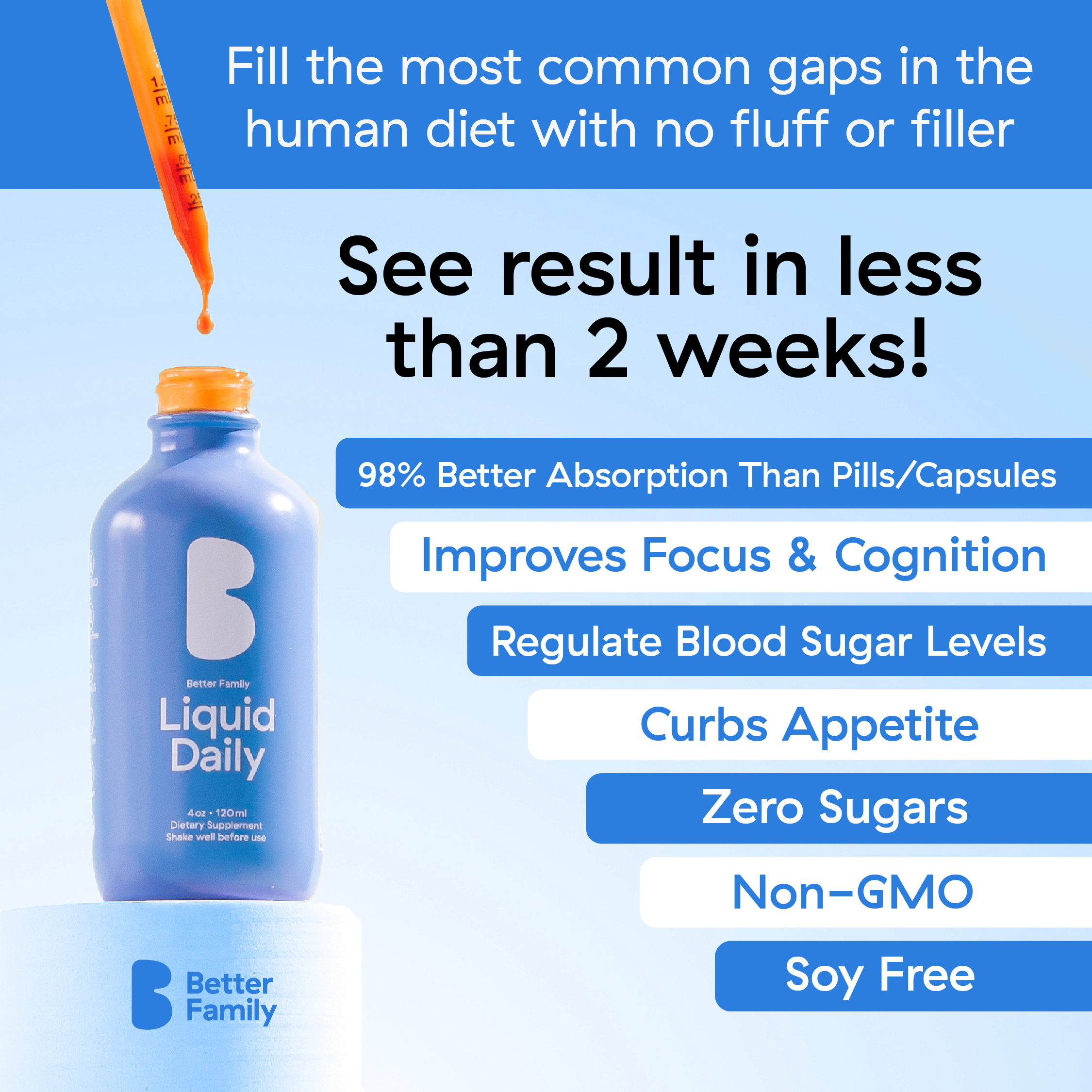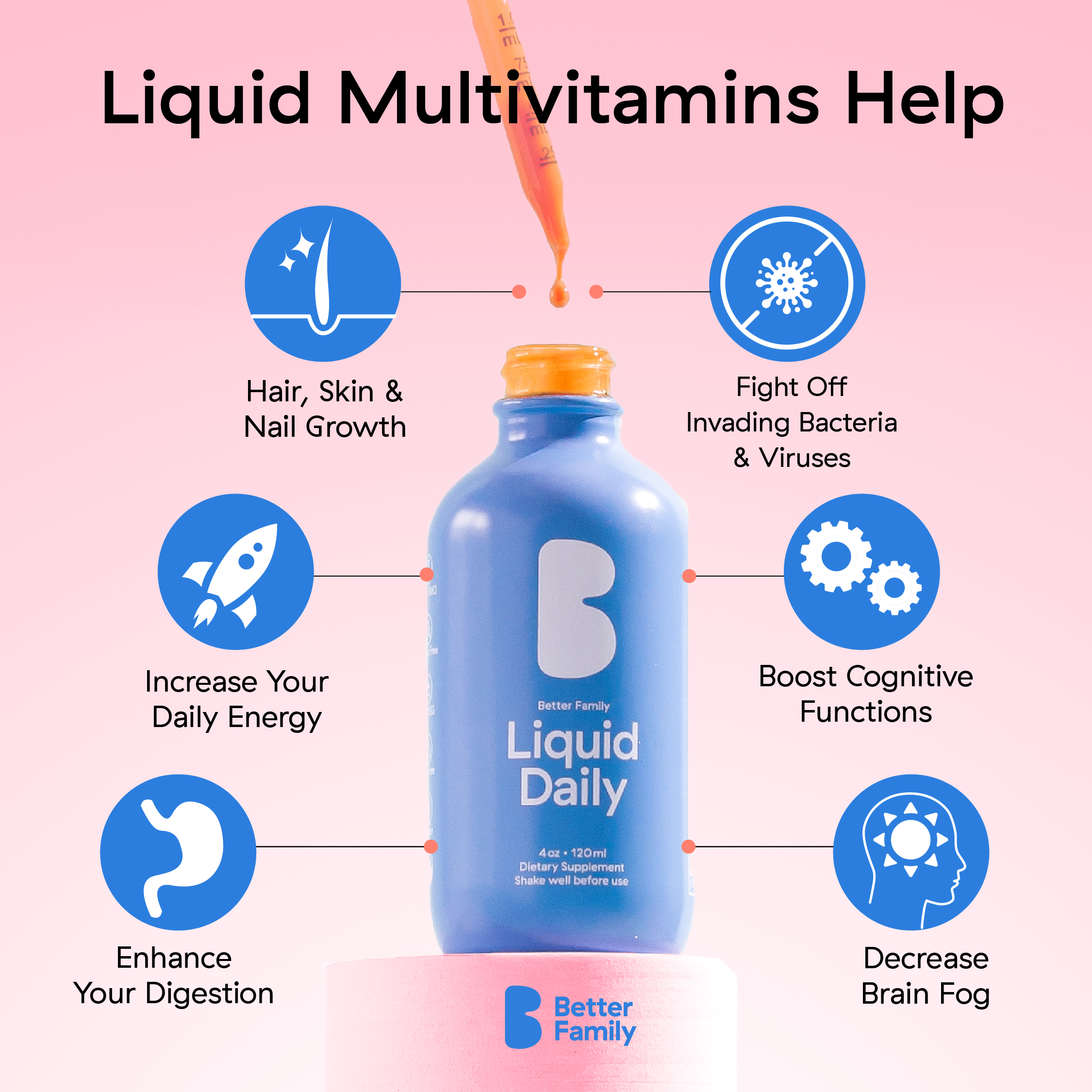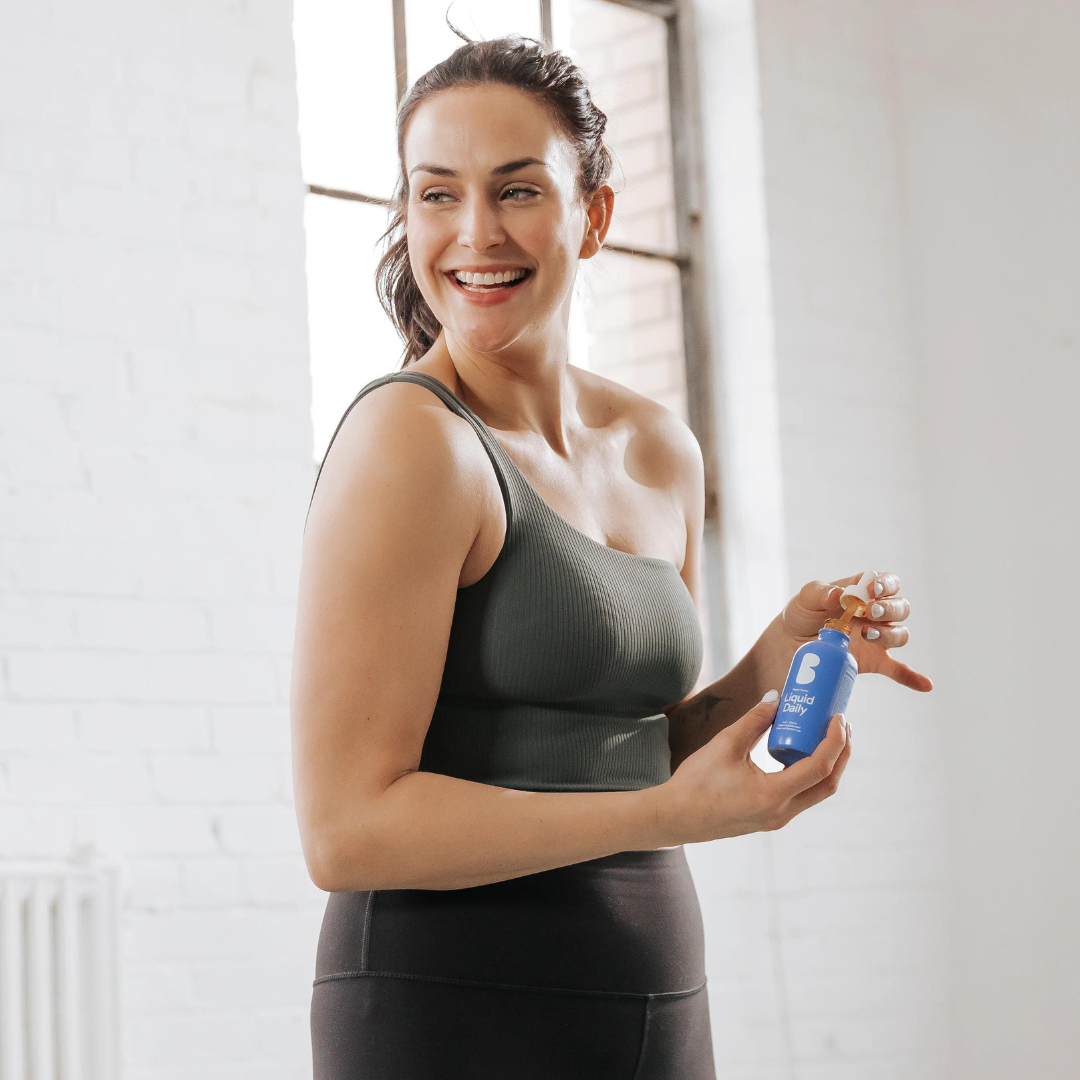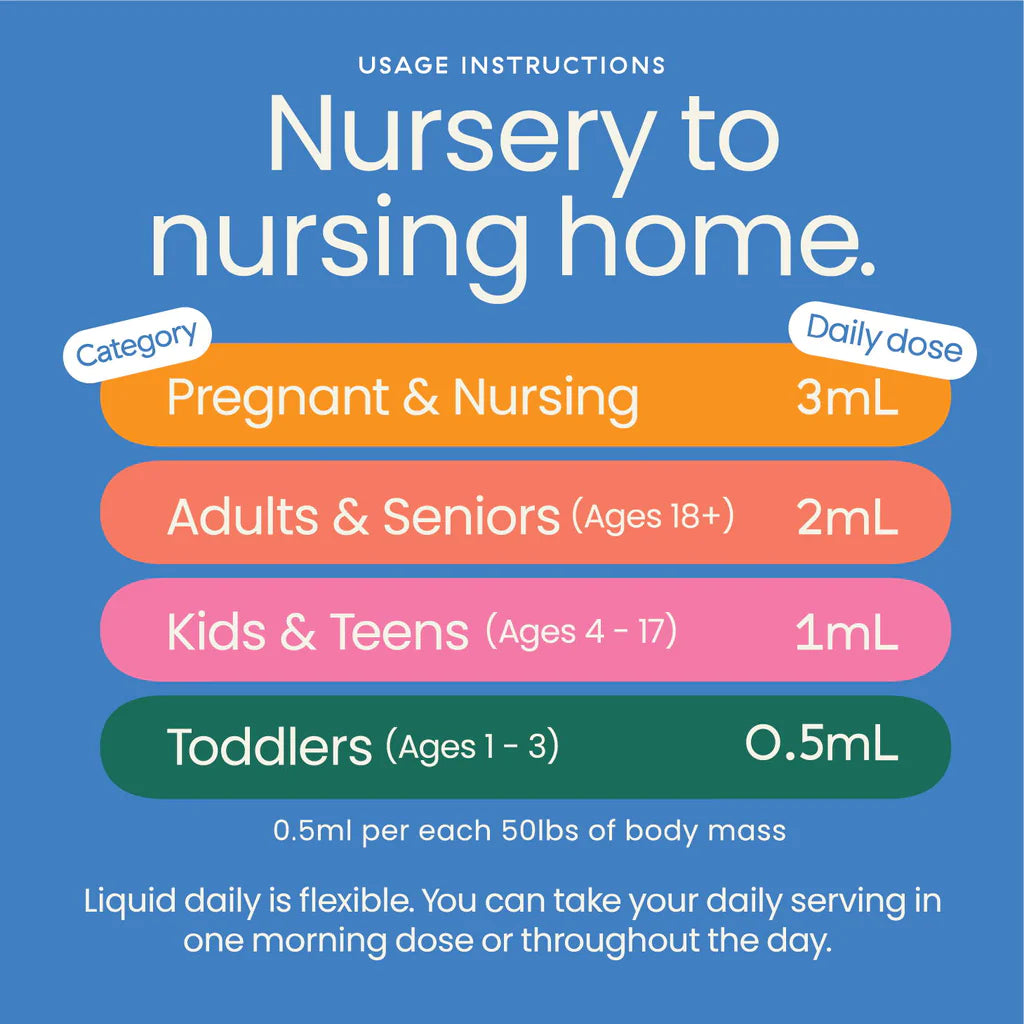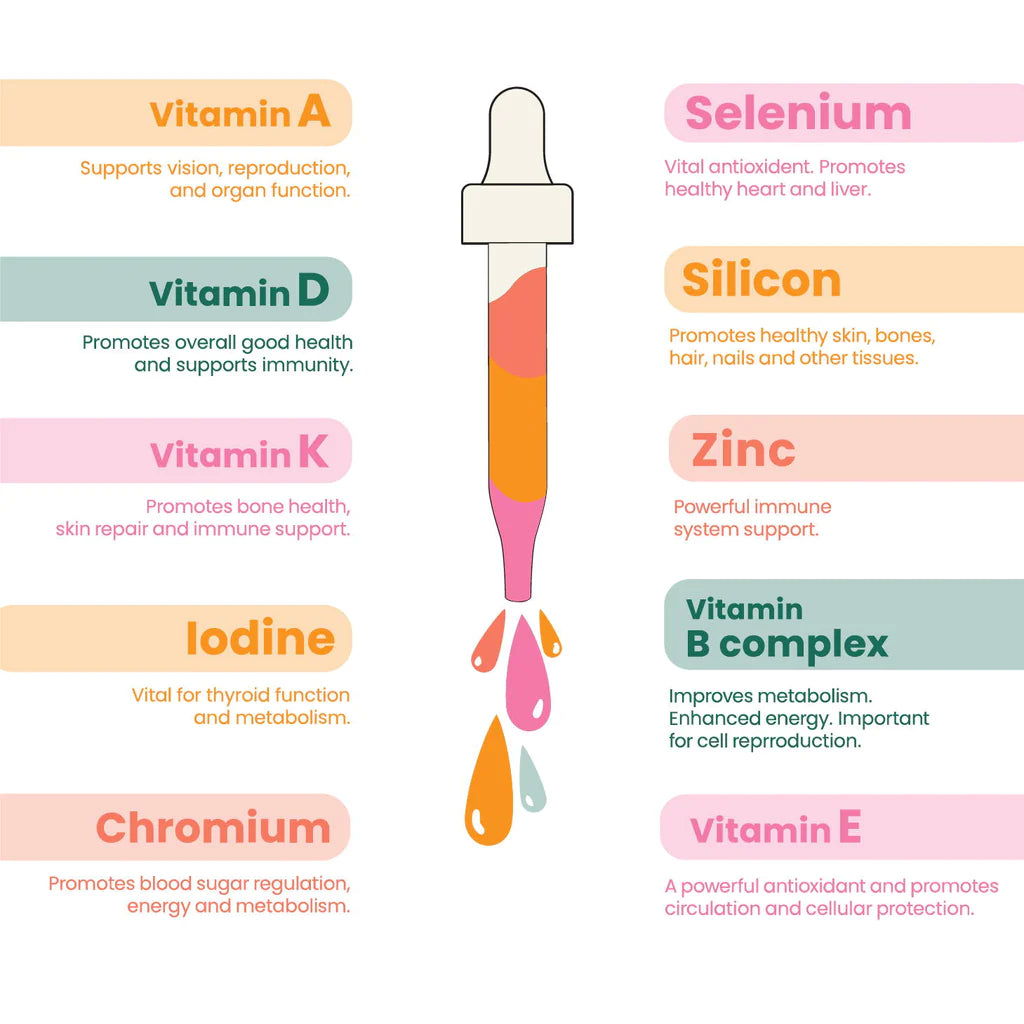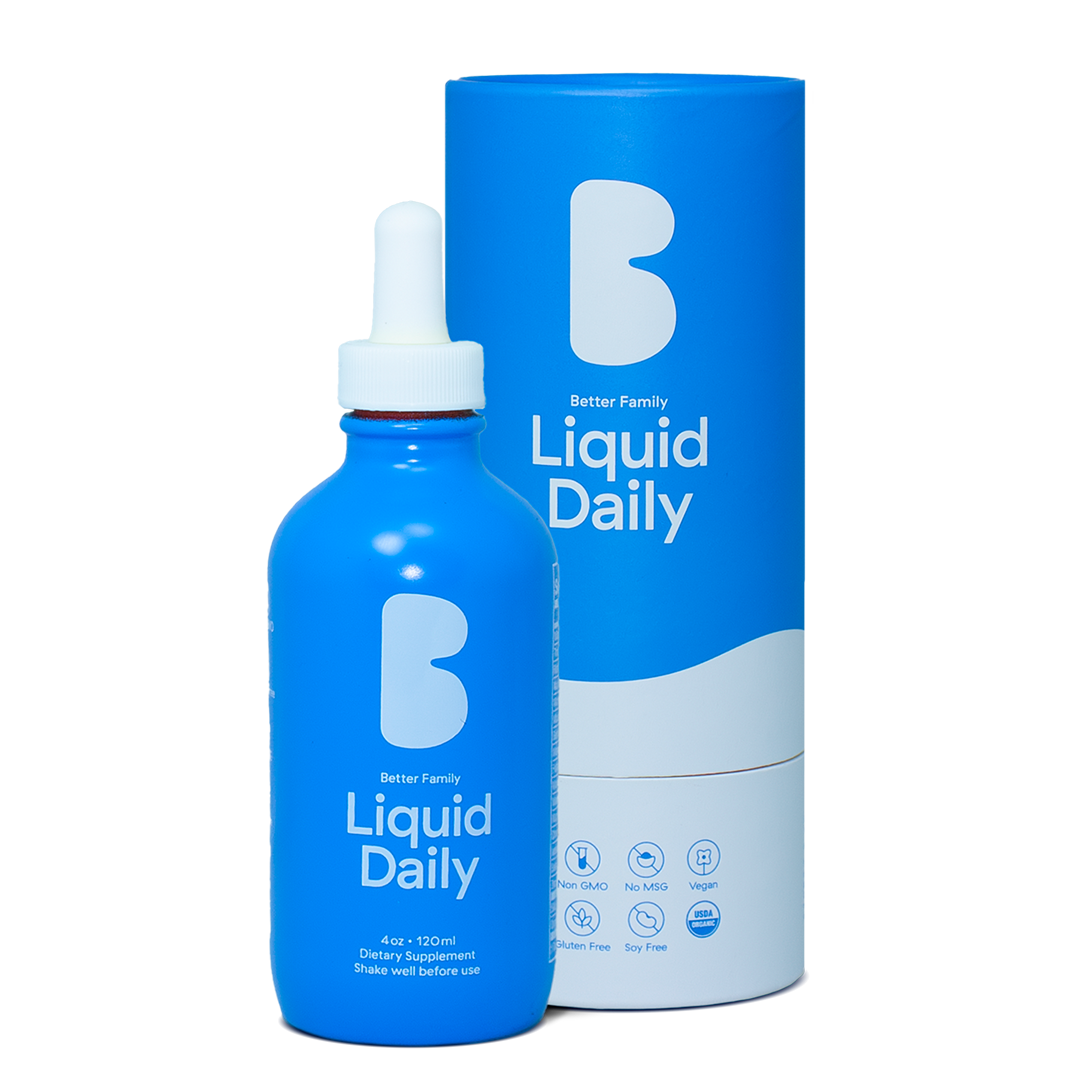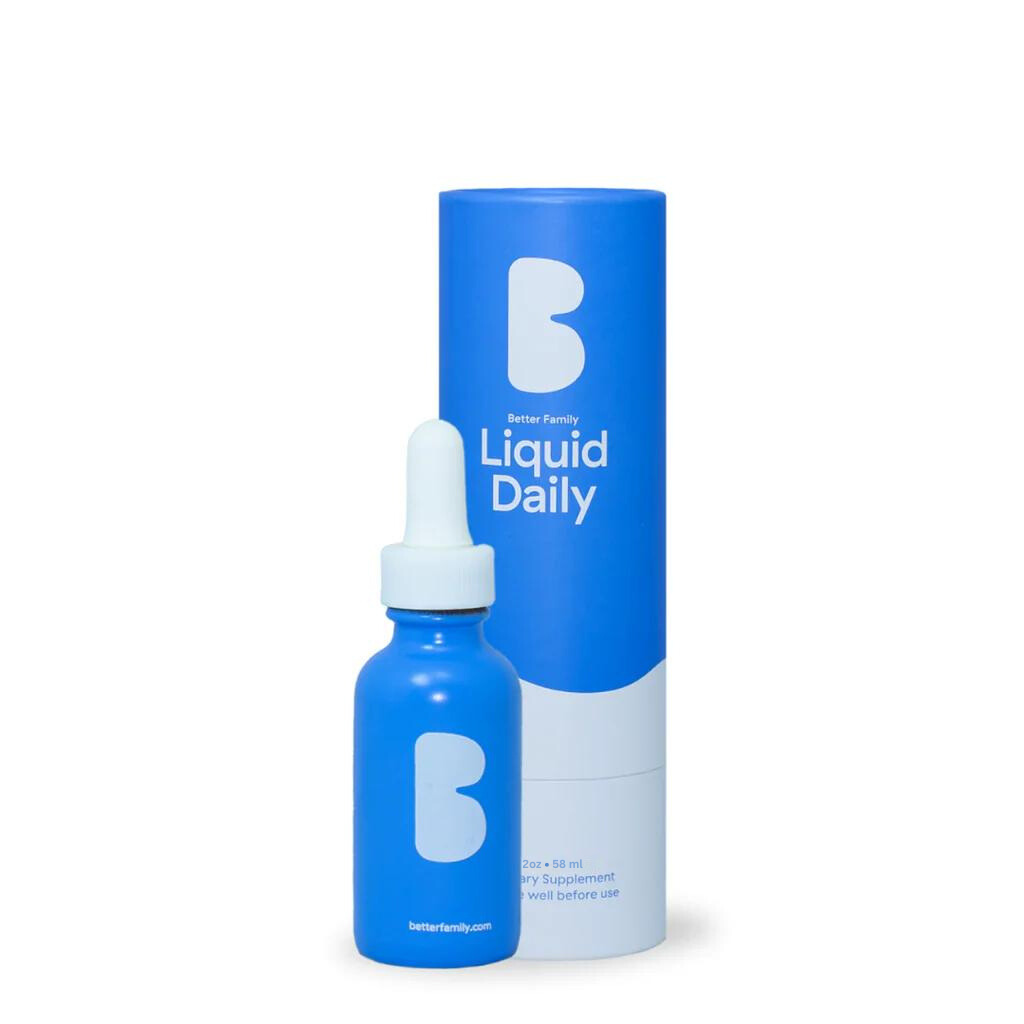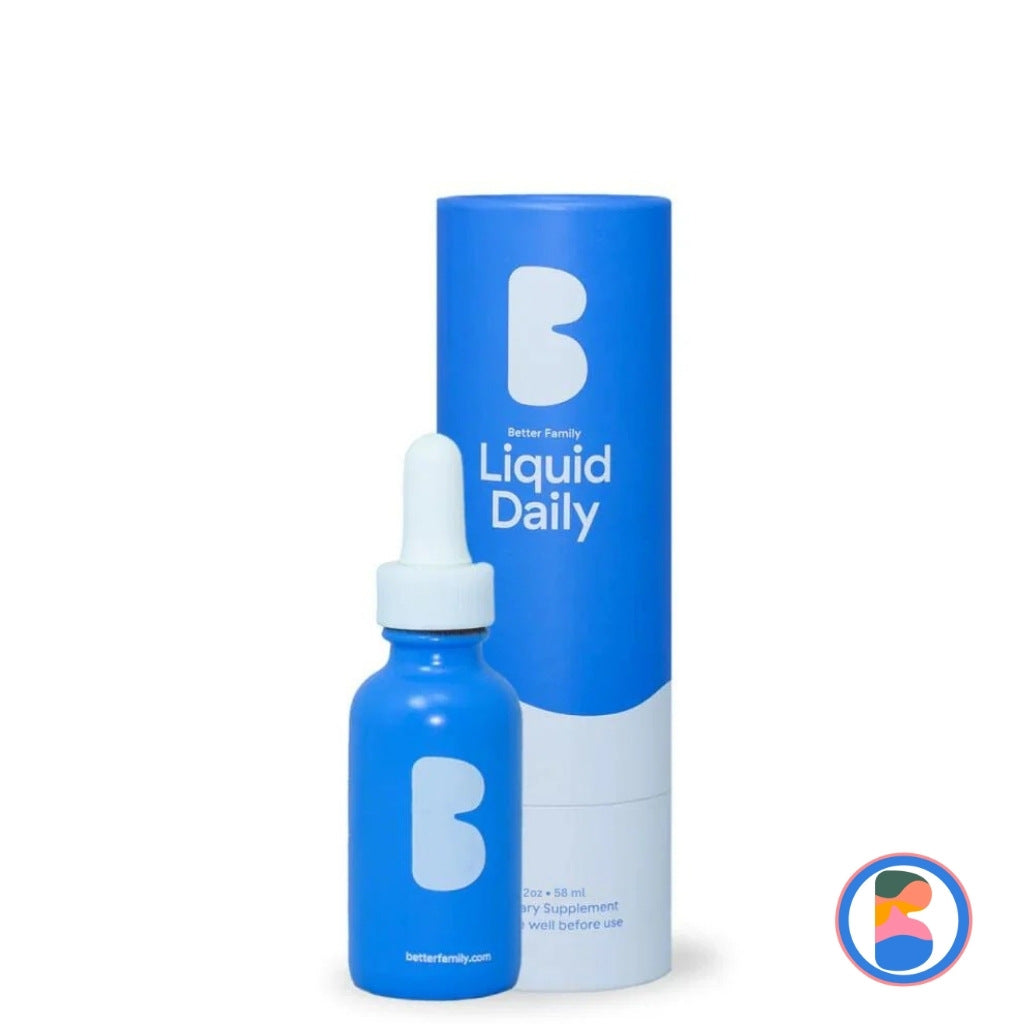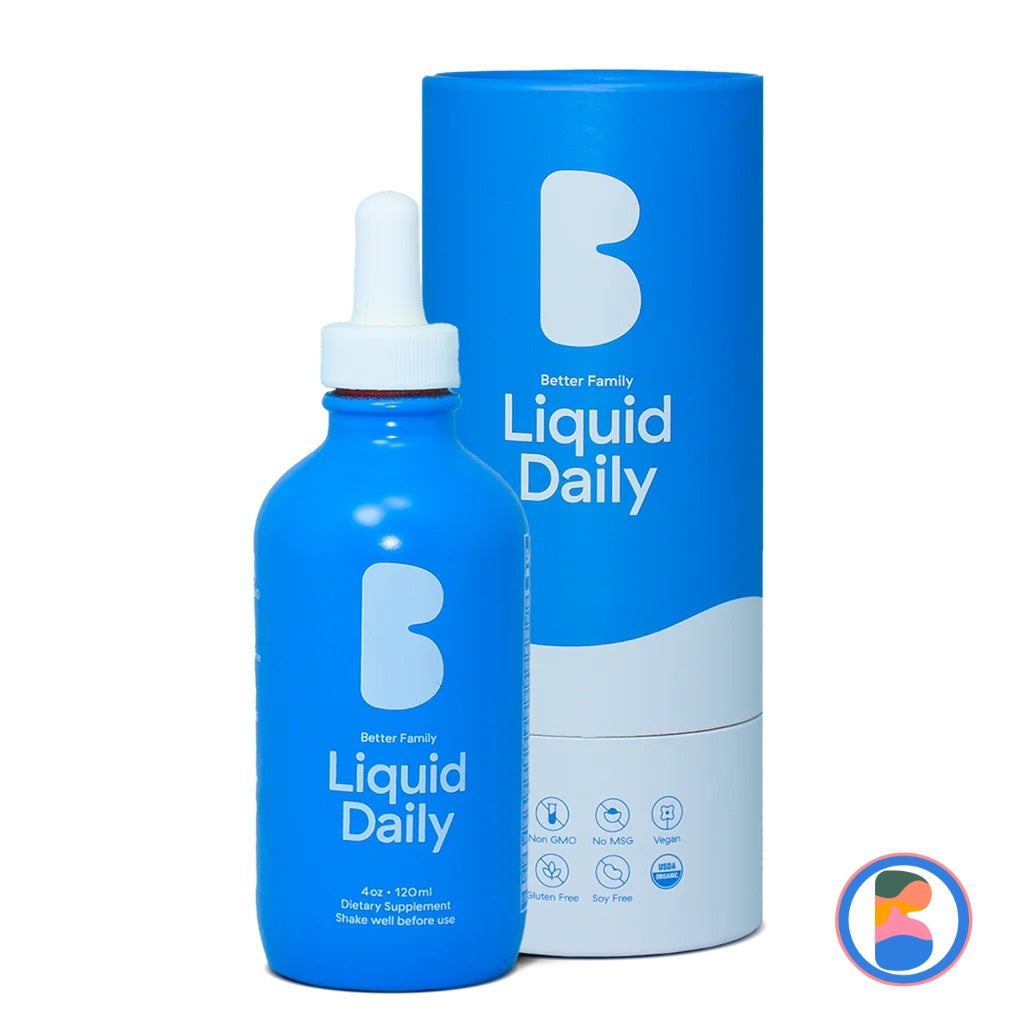Better Family Article Series
Liquid Multivitamins
The Absorption Advantage
This article series is brought to you by the team behind Liquid Daily: the better option for filling nutritional gaps in your household.
Liquid Is Better
Simplify Your Routine
You're In Control

Article Highlights
- When you take a pill or capsule vitamin, only 10%-20% of those nutrients may be able to be absorbed by your body due to the use of fillers and binders in pills
- Liquid supplements can ensure higher bodily absorption
- Fat-soluble vitamins, like vitamins A, D, E and K, may have better absorption if taken with food
How to Absorb Multivitamins Better
If you’ve ever wondered how to absorb multivitamins better, look no further. We’ve scoured the internet for the best multivitamin absorption tips, along with recommendations for water-soluble vitamins and multivitamin supplement brands you can take for maximum absorption. We’ll also touch on multivitamins and minerals benefits to you and talk about why we think liquid vitamins are some of the best options available today.
Let’s start with fat-soluble vitamins. When we talk about fat-soluble vitamins, we mean vitamins A, D, E and K (1). These vitamins should always be taken with food, especially high fat foods, for better absorption. A 2015 study found that men who took vitamin D with a high-fat breakfast had 32% greater absorption than those who had fat-free morning meals (2). Be sure not to get over your tolerable upper intake level (UL), however (3). Fat-soluble vitamins are more likely to cause toxicity due to overdose because of their ability to be stored in the body for longer periods of time (4).
Some vitamins work better together, such as vitamin D, vitamin K and calcium, since vitamins D and K help the body absorb calcium. Iron and vitamin C are also a good idea to take together, since vitamin C aids in the release of a higher percentage of iron. It also seems to reduce the side effects many iron-deficient patients suffer from when they begin to take iron, including constipation and nausea. Vitamin A and beta-carotene can also help increase iron absorption (5).
Does Your Body Absorb Vitamins?
Every nutrient you get needs to come from either your diet or supplements. That is why it’s so important to ensure that you’re getting the vitamins and minerals you need for good health. In spite of that, a staggering 92% of the US population is suffering from at least one mineral or vitamin deficiency (6). If you are concerned that you may suffer from a vitamin deficiency, an at-home micronutrient test like this one can give you a starting point on which vitamins you are most deficient in.
When you take a pill or capsule, only 10%-20% of those nutrients make their way into your bloodstream. This is due to the use of fillers and binders in pills. Fillers and binders can also cause stomach irritation. For this reason, we recommend liquid supplements to ensure mineral and vitamin supplements absorption (7). If you’d like to know how to absorb vitamins better, sublingual (under the tongue) delivery is an optimal way to take liquid vitamins and minerals (8).
As we explained earlier, some vitamins are better taken together to ensure maximum absorption. Later on in this blog, we’ll talk about which vitamins shouldn’t be taken together. If you wonder “do you need vitamin D to absorb vitamin C?”, the answer is that you don’t. The two can be taken together if you choose, but they don’t need to be and there aren’t specific benefits to taking the two together, the way there are for other vitamins.
The most important thing to remember when it comes to these vitamins is that vitamin D is fat-soluble while vitamin C is water-soluble. Fat is what helps vitamin D absorption, so be sure to take it with high-fat meals as much as possible. When it comes to vitamin C, though, it’s best to avoid aspirin and NSAIDS (nonsteroidal anti-inflammatory drugs). Not only can those drugs lower levels of vitamin C and cause more of it to be lost in urine, but high doses of vitamin C can cause more of these drugs to stay in the body as well. High doses of vitamin C may also lower the amount of acetaminophen passed in urine, causing drug levels to rise. Oral contraceptives also decrease the effects of vitamin C in the body (9).
Try Liquid Daily
Liquid Daily is the all-in-one liquid multivitamin that can be added to any drink or juice!
- 20 Essential Vitamins & Minerals
- Advanced Liquid Absorption
- Zero sugars, fillers, or artificial flavorings
- Safe & Effective for Kids & Adults!
Can You Dissolve Multivitamins in Water?
If we’ve convinced you of the efficacy of liquid vitamins but you still have multivitamin pills lying around, you may ask yourself, “Can you crush multivitamins to dissolve them in water?” The answer is yes. Crushing vitamins for better absorption is a good way to get the most out of your current multivitamins (10). You’ll want to grind them down to a fine powder (using a mortar and pestle or pill crusher) before you dissolve them into the water. Be sure to crush only the recommended daily dose to ensure you are getting the dosage you need while avoiding potential overdose.
For those who may be curious how to absorb vitamin D better, magnesium can help with vitamin D absorption, and it’s suggested that those with high magnesium intake are less likely to suffer from vitamin D deficiency (11). It can also help to eat vitamin-D rich foods as you take your vitamin D supplements. Sources of vitamin D include sunlight, fish oils, mushrooms, vitamin D fortified milk, nuts, bananas, rice and whole wheat bread (12). You can also enhance the effects of vitamin D by taking vitamin K, and taking both may be more beneficial than vitamin D alone (13). Vitamin D is better absorbed as a liquid via liposomes than vitamin D tablets are (14). Designs for Health Liposomal D Supreme is a great choice for those who are looking for a standalone vitamin D supplement.
There are several liquid multivitamin options on the market today. Some of the best ones include Nature’s Plus Source of Life Liquid Multivitamin, Nature’s Way Alive Liquid Multi, Century Systems Miracle 2000 Total Body Nutrition, and (for those who prefer organic liquid vitamins) Mary Ruth’s Liquid Morning Multivitamin. All of these have plenty of vitamins and minerals in them, and some of these brands (such as Mary Ruth’s) also sell liquid supplements. Some of the vitamins they offer as a supplement are iron, zinc, D3 and B12, and liposomal vitamin C.
Best Time to Take Multivitamins
The best time to take multivitamins really depends on what your daily schedule looks like, what times you take medication and how you plan your meals. Overall, though, you may wonder: is it better to take vitamins in the morning or at night? Some experts feel that mornings are better, since the B vitamins in them can stimulate metabolism and brain function too much in the evenings (and for this reason, the best time to take B12 may be in the morning (15). The best time to take a vitamin B complex is thirty minutes before you eat anything, since they are better absorbed on an empty stomach. They can reduce stress and improve your mood and can be taken two hours after breakfast if you’d like, making it an ideal morning vitamin (16).
Other experts, however, feel that the time of day doesn’t matter as much as the timing you choose (17). For example, ensure that you eat fat-soluble vitamins with high-fat meals, and be aware of any drugs or vitamins that shouldn’t be taken together. The best time to take multivitamins and fish oil is whenever you will remember to take them, since it’s important to take your vitamins at a consistent time every day. If you find yourself experiencing acid reflux from the fish oil, experts recommend splitting up your fish oil into smaller doses throughout the day to reduce this side effect (18).
The best time to take vitamin D (if you need extra vitamin D) is during the winter months. Unlike many of the other vitamins, vitamin D may only need to be taken seasonally, since your body naturally produces it when sunlight hits your skin (19). Vitamin D is one of many vitamins which women should take daily if they work indoors throughout the year and don’t get much sun. Other recommended daily vitamins and minerals include magnesium, calcium, iron, folate and vitamin B12 (20).
These should be incorporated into your meals via fruits, vegetables, and proteins to ensure that you eat a healthy and balanced diet as well. Wondering how long you should take multivitamin supplements? Again, this is where testing comes in handy. If you know that you are deficient in an area, you can begin taking supplements and working on how to add more of that vitamin into your diet and retest later. If you find that you no longer need a specific supplement because you are getting enough of it in your diet, then you can stop taking the supplement. The best time to take multivitamins, morning or night, depends on a number of factors and can’t be boiled down to a simple answer. You’ll want to do your research to ensure that you’re getting the proper nutrition you need.
What Vitamins Should Not Be Taken Together
Wondering which vitamins should not be taken together? Standalone supplements can interfere with the absorption of your multivitamin, so take them at different times of the day. Calcium and magnesium can interfere with the absorption of certain medications (antibiotics, statins, thyroid hormones) as well, so time those differently. Try to choose a multivitamin that provides up to the daily requirement of each nutrient rather than providing much more than you need.
If you’re curious if you can take zinc and vitamin C together, you can definitely do that. In fact, vitamin C and zinc are considered especially helpful if you have been dealing with the common cold (21). However, zinc supplements should not be taken with copper, iron, or phosphorus supplements. Those supplements should be taken 2 hours apart (22).
Can you take a multivitamin and vitamin D together? It depends on what’s in the multivitamin and the reasoning behind why you want to take it. Vitamin A can decrease vitamin D uptake, but magnesium improves vitamin D levels. For those reasons, if you are deficient in vitamin D, you may want to take your vitamin D at a different time of day than your multivitamin to ensure it’s absorbed properly (23).
There are plenty of things you can do if you aren’t sure which vitamins work best together and which ones to avoid. Again, do your research and read labels on medications, vitamins and supplements. If you are ever in doubt, don’t hesitate to ask your doctor or local pharmacist which medications and vitamins you should take and when. They are there to help you and won’t mind offering their expert opinion to ensure you get the nutrition you need with no adverse effects.
"The vitamins are tasty and the number of essential vitamins all in one liquid is fabulous!"
- Kevin M.
Experience the benefits of Liquid Daily - the lightly and naturally flavored liquid multivitamin that is packed with 20 essential vitamins and nutrients.
TRY LIQUID DAILYReferences
- Committee on Diet and Health Food and Nutrition Board. Diet and Health: Implications for Reducing Chronic Disease Risk. National Academy Press, 1989. NCBI, https://www.ncbi.nlm.nih.gov/books/NBK218749/. Accessed 3 June 2021.
- Mann, Denise. “14 Simple Ways to Make Your Vitamins More Effective.” The Healthy, 14 May 2021, https://www.thehealthy.com/nutrition/vitamins/simple-ways-make-vitamins-effective/. Accessed 3 June 2021.
- Ararson, Atli. “The Fat-Soluble Vitamins: A, D, E, and K.” Healthline, 16 February 2017, https://www.healthline.com/nutrition/fat-soluble-vitamins. Accessed 3 June 2021.
- Center for Ecogenetics and Environmental Health. Fat-Soluble Vitamins: The Good and the Bad. "Fast Facts" Flyer. July 2015. washington.edu, https://depts.washington.edu/ceeh/downloads/Fast Facts Fat Soluble Vitamins 063015.pdf. Accessed 3 June 2021.
- Tan, Verena. “How to Increase the Absorption of Iron From Foods.” Healthline, 3 June 2017, https://www.healthline.com/nutrition/increase-iron-absorption. Accessed 3 June 2021.
- the biostation. “92% of US Population Has Vitamin Deficiency: Are You One of Them?” the biostation, 3 February 2014, https://thebiostation.com/bioblog/do-you-have-vitamin-deficiency/. Accessed 4 June 2021.
- Bhogal, Ramneek S. “Are Liquid Vitamins Better Than Pills?” DaVinci Laboratories, 26 April 2019, https://blog.davincilabs.com/blog/are-liquid-vitamins-better-than-pills. Accessed 4 June 2021.
- Hua, Susan. “Advances in Nanoparticulate Drug Delivery Approaches for Sublingual and Buccal Administration.” National Institutes of Health, 5 November 2021, https://www.ncbi.nlm.nih.gov/pmc/articles/PMC6848967/. Accessed 4 June 2021.
- Mount Sinai. “Vitamin C (Ascorbic Acid).” Mount Sinai, 2021, https://www.mountsinai.org/health-library/supplement/vitamin-c-ascorbic-acid. Accessed 4 June 2021.
- Nazarian, David. “How to Add Vitamins to Water.” WikiHow, 6 May 2021, https://www.wikihow.com/Add-Vitamins-to-Water. Accessed 4 June 2021.
- BetterYou. “Magnesium and vitamin D - Benefits, Dosages and Which Types of Supplements to Take.” BetterYou, 10 September 2019, https://betteryou.com/blogs/health-hub/magnesium-vitamin-d-benefits-dosages-types-supplements. Accessed 4 June 2021.
- National Institutes of Health. “Vitamin D.” National Institutes of Health, 2021, https://ods.od.nih.gov/factsheets/VitaminD-HealthProfessional/. Accessed 3 June 2021.
- van Ballegooijen, Adriana J., et al. “The Synergistic Interplay between Vitamins D and K for Bone and Cardiovascular Health: A Narrative Review.” PMC and NCBI, 2017 September 12, https://www.ncbi.nlm.nih.gov/pmc/articles/PMC5613455/. Accessed 7 June 2021.
- Kubala, Jillian. “The 12 Best Vitamin D Supplements of 2021.” Healthline, 10 May 2021, https://www.healthline.com/nutrition/best-vitamin-d-supplements#liquid. Accessed 7 June 2021.
- Wilson, Debra Rose. “When is the Best Time to Take Vitamins?” Healthline, 3 September 2018, https://www.healthline.com/health/best-time-to-take-vitamins. Accessed 7 June 2021.
- Kennedy, David o., et al. “Effects of High-Dose Vitamin B Complex with Vitamin C and Minerals on Subjective Mood and Performance in Healthy Males.” PMC and NCBI, 8 May 2010, https://www.ncbi.nlm.nih.gov/pmc/articles/PMC2885294/. Accessed 7 June 2021.
- Cooperman, Tod. “When is the Best Time of Day to Take a Multivitamin?” ConsumerLab, 7 November 2018, https://www.consumerlab.com/answers/what-is-the-best-time-to-take-a-multivitamin/best-time-to-take-multivitamin/. Accessed 7 June 2021.
- Link, Rachel. “When is the Best Time to Take Fish Oil?” Healthline, 7 February 2020, https://www.healthline.com/nutrition/best-time-to-take-fish-oil. Accessed 7 June 2021.
- Harvard Health Publishing. “Vitamin D and Your Health: Breaking Old Rules, Raising New Hopes.” Harvard Health, 17 Mat 2019, https://www.health.harvard.edu/staying-healthy/vitamin-d-and-your-health-breaking-old-rules-raising-new-hopes. Accessed 7 June 2021.
- Kassel, Gabrielle. “According to Nutritionists, These Are the 7 Ingredients Your Multivitamin Should Have.” Healthline, 2 July 2020, https://www.healthline.com/health/food-nutrition/best-vitamins-to-take-daily#7.-Vitamin-B-12. Accessed 7 June 2021.
- Maggini, S., et al. “A Combination of High-Dose Vitamin C Plus Zinc for the Common Cold.” The Journal of International Medical Research, no. 40, 2012, pp. 28-42. Sage Pub, https://journals.sagepub.com/doi/pdf/10.1177/147323001204000104#:~:text=3 Taken together, data from,cold symptoms in healthy individuals. Accessed 7 June 2021.
- IBM Micromedex. “Zinc Supplement (Oral Route, Parenteral Route).” Mayo Clinic, 1 March 2021, https://www.mayoclinic.org/drugs-supplements/zinc-supplement-oral-route-parenteral-route/precautions/drg-20070269?p=1. Accessed 7 June 2021.
- Sammy, Melissa. “Dangerous Duos: 5 Supplement Combos to Avoid.” MD Linx, 10 June 2020, https://www.mdlinx.com/article/dangerous-duos-5-supplement-combos-to-avoid/4clJmVB8yYuNCZjX1sjB2K. Accessed 7 June 2021.
More articles from Better Family
- Family Multivitamin
- Liquid Multivitamins
- Best Liquid Multivitamin for Kids
- Chewable vs Liquid Vitamins
- Comparing Monthly Vitamin Subscriptions
- Best Multivitamin for the Whole Family
- Family Diet And Menu Planning
- Multivitamin Liquid Side Effects
- Best Vitamin B12 Liquid Drops
- Liquid Children's Vitamins
- Vitamin Subscription Box
- Good Tasting Liquid Vitamins
- Liquid Vitamin B6 Supplement
- Liquid Selenium Supplement
- Liquid Vitamin E Supplement
- Liquid Vitamin B1 Supplement
- Liquid Vitamin B3 Supplement
- Family Health Goals
- Family Health Goals
- Family Health and Wellness Programs
- How to Absorb Multivitamins Better
- Family Nutrition Tips
- Liquid Multivitamin for Adults
- Liquid Multivitamin for Seniors
- Liquid Vitamins and Minerals
- Why Do We Need To Take Multivitamins?
- Liquid Zinc Supplement
- Vitamin Absorption Chart
- Vitamins That Taste Good
- Liquid Chromium Supplement
- Liquid Silicon Dioxide Supplement
- Liquid Vitamin D Supplement
- Liquid Vitamin B9 Supplement
- Vitamin Subscription Services
- Can You Dissolve Multivitamins in Water?
- Organic Liquid Multivitamins and Minerals
- Tasteless Liquid Vitamins
- Nutrition For The Whole Family
- B Complex Liquid Drops
- Best Liquid Vitamins for Elderly
- Soluble Vitamins
- How To Take Multivitamins
- Tasteless Liquid Vitamins For Toddlers
- Liquid Zinc Benefits
- Best Tasting Gummy Vitamins
- Liquid Iodine Supplement
- Liquid Vitamin K Supplement
- Liquid Vitamin B12 Supplement
- Liquid Vitamin B7 Supplement


